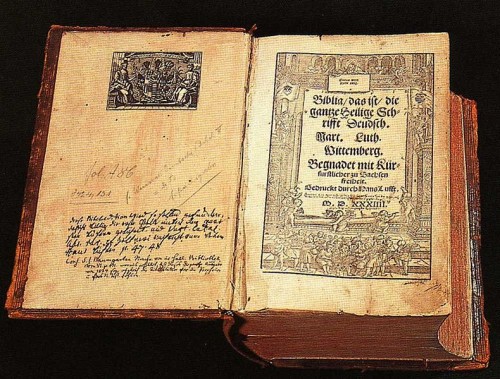The Ninety-five Theses is a list of propositions
[for an academic disputation written in Germany, the year 1517
by Martin Luther, professor of moral theology at the University of Wittenberg,
[a worldwide event that I only learned the details by the cinema screen.
It was a 2003 epic historical drama which covers Luther's life
[from his becoming a monk in 1505 to the Diet of Augsburg in 1530,
and showed how the Ninety-five Theses started the Reformation,
[a schism in the Catholic Church, and wars, many wars that sadden me.
I am a Greek Orthodox Christian and my knowledge of the religious issues
[of the West is nil, perhaps minimal,
so I would also say of my knowledge on issues in the Orthodox Church
[and in general anything biblical.
But at the same time I, as a Greek, saw with a real surprise
[the dominant role of the Greek language in Luther's Reformation,
as after his translation of the New Testament from Greek into German, he made the Bible
the people's book in church, school, and house.....
and I believe of this fact, there is no question, denial or negation.
___________________________________________________________________________* ''IT COULD BE OTHERWISE in verse''
Texts and Narration: Odysseus Heavilayias - ROTTERDAM //
Language adjustments and text adaptation: Kellene G Safis -CHICAGO//
Digital adaptation and text editing: Cathy Rapakoulia Mataraga - PIRAEUS
______________________________________________________________

*From the original Greek :
The Martin Luther Bible Translation : The Martin Luther Bible
translation was begun at the Wartburg castle, where he was held prisoner
by Frederick the Wise of Saxony for his own safety from May, 1521 to
April, 1522.
The New Testament was released September 21, 1522, and a second edition was produced the same December.
*The movie Luther : Is a 2003 American-German epic historical drama film loosely based on the life of Martin Luther starring Joseph Fiennes. It was an independent film partially funded by Thrivent Financial for Lutherans. The film covers Luther's life from his becoming a monk in 1505 to the Diet of Augsburg in 1530.
ELEGHOS... at history

No comments:
Post a Comment
Note: Only a member of this blog may post a comment.